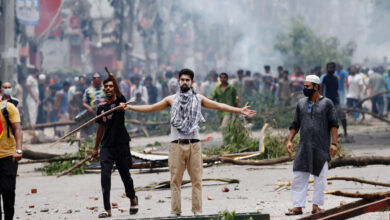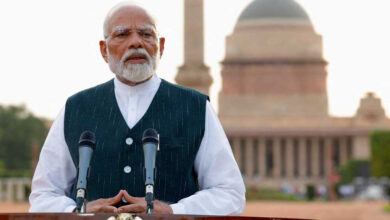Pakistani Islamist parties rally against top judge on blasphemy accusations
Hundreds of the protesters took to streets in the northwestern city of Peshawar, chanting slogans against the chief justice

Islamabad: Hundreds of supporters from Pakistani Islamist parties on Friday rallied to protest against what they say were blasphemous remarks by the country’s chief justice.
The protest call, by various religious and political groups led by hardline Tehreek-e-Labaik Pakistan (TLP) whose rallying cry is “death to blasphemers”, said that remarks by Chief Justice of Pakistan Qazi Faez Isa in a case against a member of the minority Ahmadi community were blasphemous.
The court had granted bail to an Ahmadi community member earlier this week, ruling that blasphemy charges against him did not stand. The man, accused of blasphemy for distributing Islamic literature, had been in jail for 13 months.
“We (will) monitor the sermons and protests outside mosques,” said police official Abrar Hussain in southern city of Karahci, warning the protesters to remain peaceful.
Hundreds of the protesters took to streets in the northwestern city of Peshawar, chanting slogans against the chief justice, said police official Mubarak Khan.
The top court on Thursday issued a statement after the Islamist parties and some political groups launched a campaign accusing the chief justice of deviating in his ruling from the constitutional definition of a Muslim, which excludes Ahmadis.
“This impression is absolutely wrong,” the court statement said, deploring what it called a “vicious campaign” against Isa.
The campaign against Isa was also joined by some supporters and aides of jailed former Prime Minister Imran Khan, who think a ruling by the chief justice stripping Khan’s party of its symbol on ballots cost them votes in an election on Feb. 8.
Khan’s Pakistan Tehreek-e-Insaf (PTI) party’s information secretary Rauf Hasan did not respond to a request for a comment.
Human rights groups say Pakistan’s harsh blasphemy laws are often misused to settle personal scores, and just accusing someone of such a crime could lead to mob justice.
Judges hesitate to take up such cases for fear of retribution, which leaves accused languishing in jail for years without cases being heard.
Blasphemy is punishable by death in Pakistan. No one has been executed by the state for it, but numerous accused have been lynched by outraged mobs.




